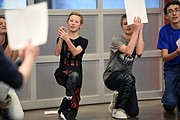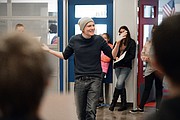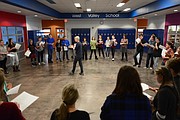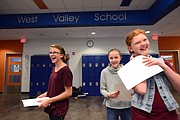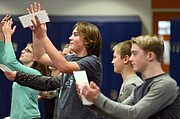A lesson in articulation and movement
In William Shakespeare’s romantic comedy “Twelfth Night” the characters are pierced by love rather than the sword.
From a shipwreck and ensuing love triangle — West Valley School sixth-, seventh- and eighth-graders recently gained insight into the follies of human nature as the play explored identity, desire, love, irrationality, sorrow, disguise and deception through comedy.
Professional actors with Montana Shakespeare in the Schools, an educational outreach program of Shakespeare in the Parks, recently performed the Shakespearean play in a 75-minute production at West Valley.
The cast also made stops at Kalispell Middle School and Columbia Falls High School.
The troupe of eight draws actors from around the country to tour Montana and surrounding states performing Shakespeare’s plays followed by enrichment workshops between students and actors. The goal is to reach students in rural areas where access to professional-level theater is not available, according to actor Ben Barker.
On Nov. 14, West Valley seventh-graders formed a large circle around Barker and actor Ariel Richardson who were leading a language workshop. The purpose of the workshop was to teach how articulation and movement can help students unpack the language of Shakespeare and find meaning.
Students began with a vocal warm-up paying attention to packing each word with a punch. The group then talked about what daily situations enunciation might be important to expressing ideas clearly.
Barker and Richardson handed then handed out emojis of cartoon faces expressing anger, happiness, surprise, fright and sadness. Then they are given a line from the play. Students are instructed to first read the line with no emotion, and then again with the emotion of their emoji.
When the “anger” group was up seventh-grader Taryn Haynes fell to her knees inching forward and clasping her hands together.
“Pray God defend me,” she said in unison with her group.
After going through all the emotions Richardson asked which one made the most sense for the line and why. The groups agreed that a scared emotion fit the line as Richardson talked about how the word “defend,” might help them reach that conclusion.
Before moving into the next exercise, Barker reminded them how Shakespeare uses consonants and vowels to inform the audience what is happening.
“When characters speak with a lot of consonants and a lot of articulation usually they’re trying to communicate an argument to somebody else,” Barker said. “And when you see a lot of vowels and ‘thees’ and ‘ohs and ahs,’ usually that means the character, or whoever is speaking that, is feeling a lot of emotions.”
The next exercises helped students understand how performance and physical movement can really help in translating the language of Shakespeare.
“Shakespeare didn’t write the plays to be read. Often in school we read plays, but Shakespeare wrote the plays to be heard and to be seen,” Barker said. “So, when we’re working through this we’ll slowly discover it makes a lot more sense when we speak it out loud because that was how it was meant to be.”
In the next exercise, each student is given a line from a monologue and asked to find a word that sticks out to them in relaying what the character is trying to impart through a gesture. The actors go around and help students with word definition or pronunciation such as the word “churlish,” in seventh-grader Bridger Jones’ line.
“Churlish,” Jones repeated the word to himself.
“... Invites me in this churlish messenger,” he said flinging his hands forward and up.
Getting back into a large circle the students go down the line individually saying their lines gesture. Students ease into the drama of performance as they practice in unison.
“The first time we read it, it was pretty robotic and it didn’t really make much sense,” Barker said noting that is can sound monotonous. “But this last time when we read it, what was so cool is that I heard the frustration. I heard the emotion popping up. I heard like, how am I going to deal with all of this?”
Even though some students had the same line they each picked up on different words or gestures, which is the fun in interpreting a role as an actor Barker said.
In the final activity students again split up and then performed for the entire group.
“Lights, camera, action,” Barker and Richardson shouted as each group stood in the middle of the large circle for a final performance.
Performing Shakespeare makes it less daunting, Barker and Richardson agreed.
“I don’t think people realize is that we have a lot more innate understanding of language then we realize, so we’re trying to show these kids that when we break a speech up into bite-sized parts that they know a lot more than they realize,” Barker said. “When you say these words out loud they start feeling what the words are supposed to do,” Barker said.
Richardson said, “Today it was very easy to see how they took a word ... and fully inhabit it.”
“When you speak it out loud those words become alive,” she said.
Reporter Hilary Matheson may be reached at 758-4431 or hmatheson@dailyinterlake.com.







